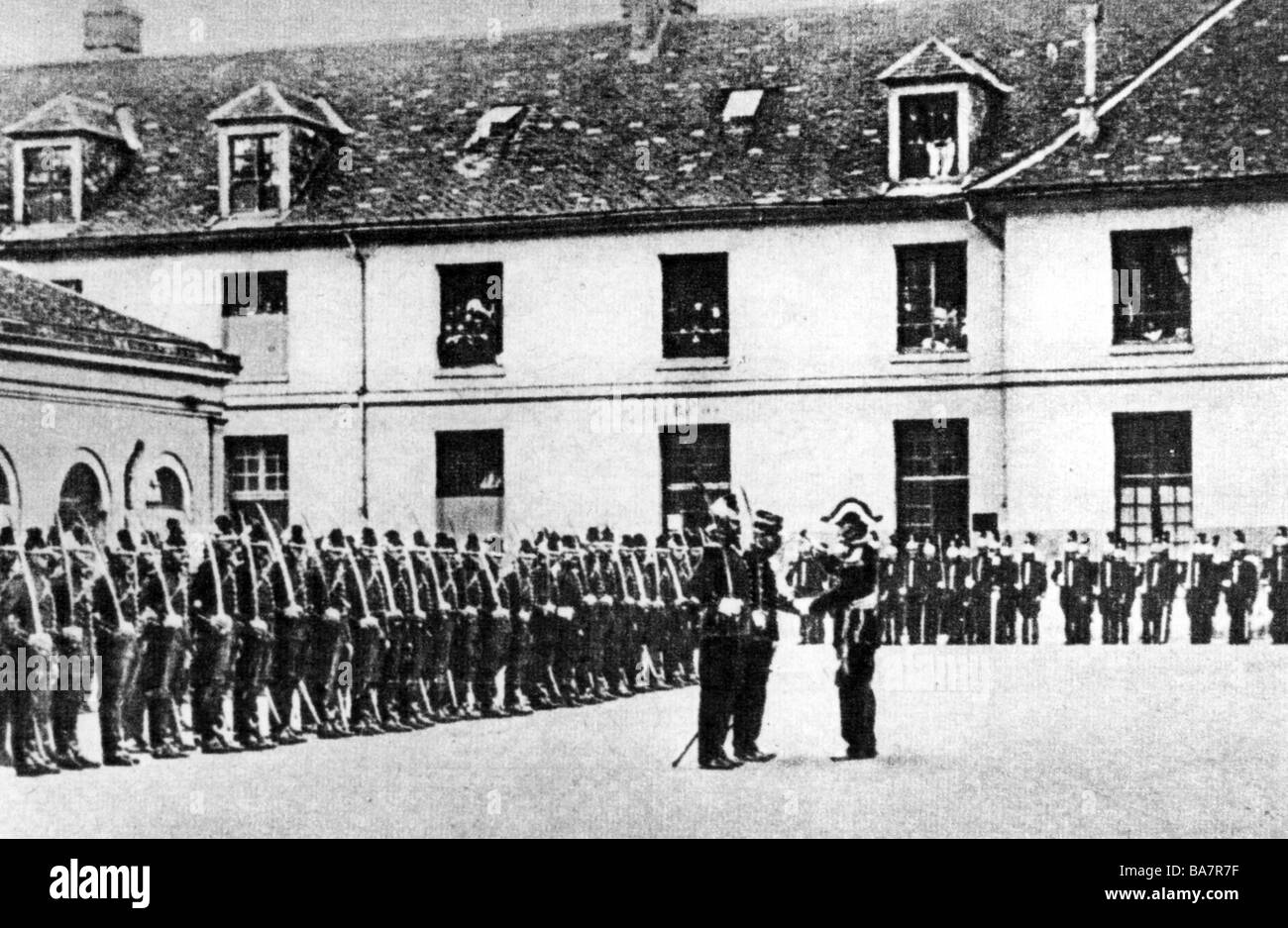Dreyfus Affair: Proposed Posthumous Promotion For A Wronged Officer

Table of Contents
The Injustice of the Dreyfus Affair
The False Accusation and Trial
In 1894, Captain Alfred Dreyfus, a Jewish officer in the French Army, was falsely accused of treason. The accusation, based on flimsy and ultimately forged evidence, centered around a bordereau (memorandum) allegedly revealing French military secrets to the Germans. His trial was a sham, characterized by a prejudiced military court determined to secure a conviction regardless of the lack of credible evidence. Dreyfus was found guilty and sentenced to life imprisonment on Devil's Island, a penal colony off the coast of French Guiana.
- Dubious Evidence: The prosecution relied heavily on handwriting analysis that was later proven flawed and biased. Other evidence was manipulated or outright fabricated.
- Antisemitic Bias: The atmosphere surrounding the trial was heavily charged with antisemitism. Many within the French military and broader society harbored deep-seated prejudices against Dreyfus, influencing the investigation and trial proceedings.
- Military Cover-up: The French Army prioritized protecting its reputation and concealing its own incompetence over upholding justice. This led to a deliberate suppression of exculpatory evidence and the persecution of those who dared to question the conviction.
The Role of Antisemitism in the Affair
The Dreyfus Affair was not merely a case of wrongful conviction; it was a manifestation of widespread antisemitism within the French Army and society. This pervasive prejudice fueled the persecution of Dreyfus and shaped the course of the affair.
- Antisemitic Propaganda: Antisemitic pamphlets and newspapers fanned the flames of hatred against Dreyfus, portraying him as a traitor and a symbol of Jewish disloyalty.
- Biased Investigation: The investigation itself was tainted by antisemitic biases, leading investigators to focus on evidence that confirmed their preconceived notions and ignore or suppress information that pointed towards Dreyfus's innocence.
- Public Opinion: A significant portion of the French public was swayed by antisemitic propaganda and embraced the narrative of Dreyfus's guilt, hindering efforts to secure his release and rehabilitation.
The Fight for Dreyfus's Rehabilitation
The Efforts of Dreyfus's Supporters
Despite the overwhelming odds, a growing number of individuals and groups fought tirelessly for Dreyfus's exoneration. Their relentless efforts eventually brought the truth to light and exposed the injustice at the heart of the affair.
- Emile Zola's "J'accuse": The publication of Emile Zola's powerful open letter, "J'accuse…!" in 1898, marked a turning point in the campaign. This courageous act of defiance brought the affair to the forefront of public debate and exposed the military's cover-up.
- Appeals and Retrials: Years of legal battles, appeals, and ultimately a retrial, were necessary to overturn Dreyfus's wrongful conviction. These efforts highlighted the flaws in the French justice system and the need for reform.
- Public Pressure: The tireless campaigning of Dreyfus's supporters, including intellectuals, journalists, and political figures, gradually shifted public opinion and created the momentum needed for his eventual exoneration.
The Impact of the Affair on French Society
The Dreyfus Affair had a profound and lasting impact on French society, exposing deep-seated societal flaws and prompting crucial reforms.
- Military Reform: The affair led to reforms within the French military, aimed at improving its judicial processes and addressing the issue of antisemitism within its ranks.
- Increased Awareness of Antisemitism: The Affair heightened awareness of the pervasiveness of antisemitism in France and spurred efforts to combat prejudice and discrimination.
- Human Rights Advancements: The fight for Dreyfus's rehabilitation contributed to a broader discussion about human rights and the importance of due process, leaving a legacy that continues to resonate today.
The Argument for Posthumous Promotion
Remedying Historical Injustice
A posthumous promotion for Alfred Dreyfus is not simply a symbolic gesture; it is a necessary step to acknowledge the grievous injustice he suffered.
- Powerful Statement: Such a promotion would serve as a powerful statement against antisemitism, wrongful conviction, and the abuse of power.
- Moral Imperative: It is a moral imperative to rectify historical wrongs and ensure that victims of injustice receive the recognition they deserve, even posthumously.
- National Reconciliation: It would be a significant step towards national reconciliation, acknowledging a dark chapter in French history and reaffirming the nation's commitment to justice.
Restoring Dreyfus's Honor
The posthumous promotion would restore Dreyfus's military honor, recognizing his unwavering loyalty to France despite the persecution he endured.
- Symbolic Rehabilitation: The promotion would be a profound act of symbolic rehabilitation, underscoring the injustice he faced and affirming his patriotism.
- Recognition of Loyalty: It would formally acknowledge Dreyfus's commitment to his country and his resilience in the face of unimaginable adversity.
- Correcting the Record: The promotion would formally correct the historical record, ensuring that Dreyfus's name is cleared and his legacy is rightfully honored.
The Significance of the Gesture
The significance of a posthumous promotion extends beyond the individual case of Alfred Dreyfus. It is a symbolic acknowledgement of the past and a commitment to fighting injustice today.
- Social Justice Implications: The move would have significant implications for current conversations on social justice and the importance of addressing historical injustices.
- Continuing the Fight: It would serve as a powerful reminder that the fight against antisemitism and wrongful convictions is ongoing.
- Inspiring Future Generations: The gesture would inspire future generations to stand up against injustice and to strive for a more equitable and just society.
Conclusion
The Dreyfus Affair remains a potent symbol of the dangers of unchecked prejudice and the importance of fighting for justice. While Dreyfus was eventually exonerated, the deep scars of this injustice remain. A posthumous promotion, more than a mere formality, would represent a profound act of national reconciliation, acknowledging the profound wrong done to a loyal officer and serving as a powerful reminder of the continuing fight against antisemitism and wrongful convictions. It is time to honor Captain Alfred Dreyfus with the posthumous promotion he rightfully deserves. Let us ensure that the lessons of the Dreyfus Affair are not forgotten and that the fight for justice continues. Learn more about the Dreyfus Affair and the campaign for his posthumous promotion by exploring relevant resources online. Join the movement advocating for a just recognition of this wrongly accused officer.

Featured Posts
-
 U S Penny Phase Out Circulation To End By Early 2026
May 24, 2025
U S Penny Phase Out Circulation To End By Early 2026
May 24, 2025 -
 Hollywood At A Standstill The Combined Actors And Writers Strike
May 24, 2025
Hollywood At A Standstill The Combined Actors And Writers Strike
May 24, 2025 -
 Umgebung Essener Uniklinikum Aktuelle Geschehnisse
May 24, 2025
Umgebung Essener Uniklinikum Aktuelle Geschehnisse
May 24, 2025 -
 Shareholders Approve All Resolutions At Imcd N V Annual General Meeting
May 24, 2025
Shareholders Approve All Resolutions At Imcd N V Annual General Meeting
May 24, 2025 -
 Al Roker And Today Show Co Host Clash Off The Record Conversation Revealed
May 24, 2025
Al Roker And Today Show Co Host Clash Off The Record Conversation Revealed
May 24, 2025
